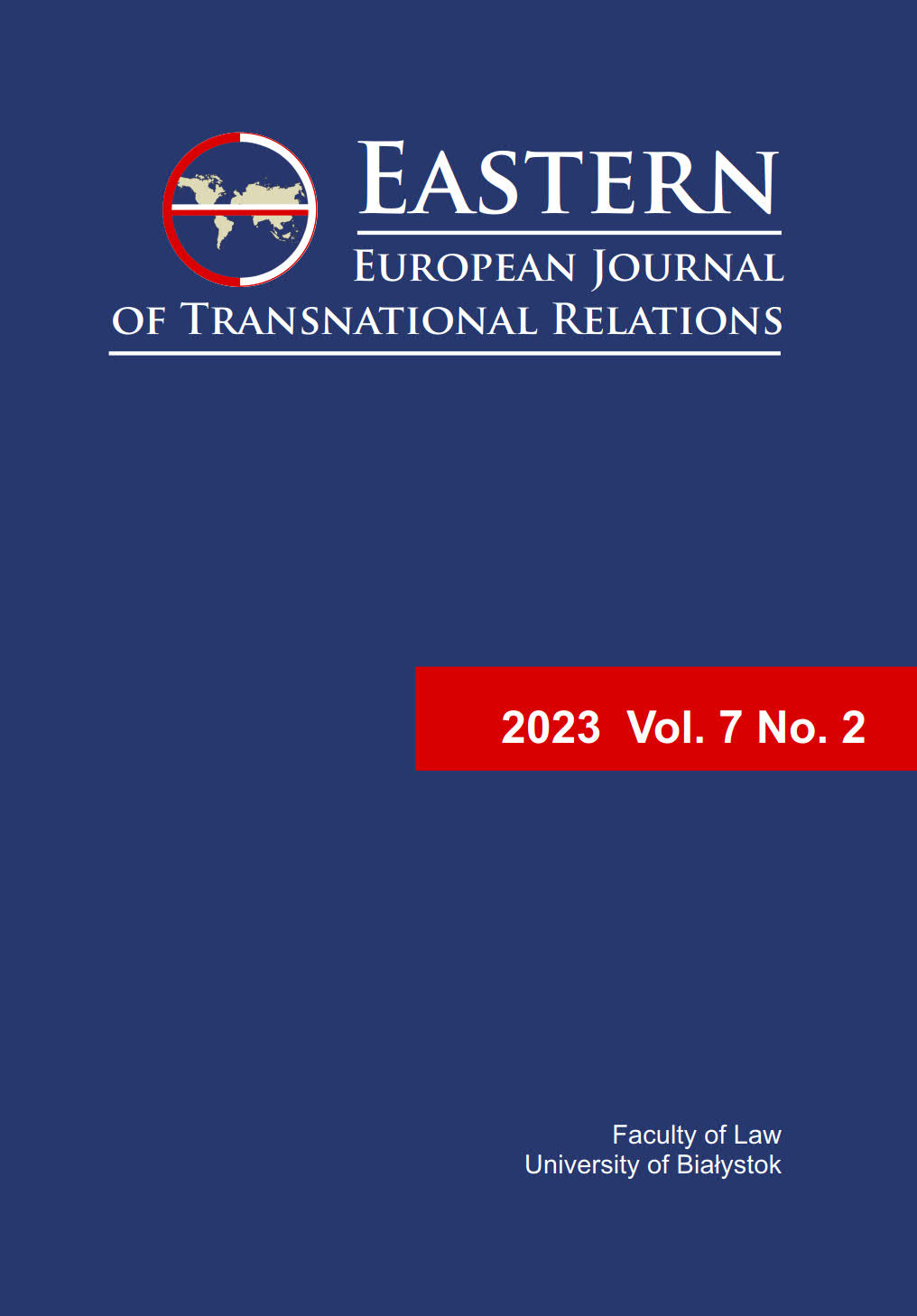Competences of the minister in charge of health related to the organisation of the provision of health services assisting procreation
DOI:
https://doi.org/10.15290/eejtr.2023.07.02.04Słowa kluczowe:
minister in charge of health, competences, medically assisted procreationAbstrakt
The purpose of the publication is to answer the question whether, on the basis of the Act on Infertility Treatment, the minister in charge of health, as the central authority of government administration with the most extensive competences in the field of health, mainly realises, as assumed in the literature, normative competences, or whether he also undertakes other types of activities within the scope of the tasks set out by this Act. Its realisation, therefore, required an analysis of the competences of the minister in charge of health related to the organisation of the provision of health services in the field of medically assisted procreation, as defined by the aforementioned Act. This analysis was carried out using the dogmatic-legal method supported by scientific views. The analysis made it possible to establish, that this minister exercises two basic groups of competences: normative and competences to apply the law, which include the competences to: control, supervision, issue administrative decisions, as well as the competences to perform factual actions, including material-technical ones, and social-organizational actions. Thus, a conclusion can be drawn that it has been equipped with a whole range of forms of activity that allow the realisation of the values assumed by the legislator, among which the type of activity such as issuing normative acts taking the form of universally binding regulations plays an important role.
Pobrania
Bibliografia
Adamiak, B. & Borkowski, J. (2022). Kodeks postępowania administracyjnego. Komentarz, Legalis.
Boć, J. & Kuta, T. (1984). Prawo administracyjne. Zagadnienia podstawowe. PWN.
Boć, J. & Miemiec, M. (1993). Organizacja prawna administracji. In J. Boć (Ed.), Prawo administracyjne. Kolonia Limited.
Bojanowski, E. (2005). Cofnięcie uprawnienia w przepisach prawa administracyjnego (kilka uwag). In Podmioty administracji publicznej i prawne formy ich działania. Studia i materiały z konferencji Naukowej poświęconej Jubileuszowej 80-tych urodzin Profesora Eugeniusza Ochendowskiego, Toruń 15-16 listopada 2005. TNOIK „Dom Organizatora”.
Bojanowski, E. (1981). Konstrukcja kompetencji organu administracji państwowej. Zeszyty Naukowe Wydziału Prawa i Administracji Uniwersytetu Gdańskiego, 9.
Borówka, K. (2018). Zarządzenie zastępcze wojewody. Lex.
Chełmoński, A. (2003). Nadzór policyjny i reglamentacyjny w administracyjnym prawie gospodarczym. In M. Borkowski, A. Chełmoński, M. Guziński, K. Kiczka, L. Kieres & T. Kocowski (Eds.), Administracyjne prawo gospodarcze. Kolonia Limited.
Cieślak, Z. (1992). Zbiory zachowań w administracji państwowej. Zagadnienia podstawowe. Wydawnictwo Uniwersytetu Warszawskiego.
Dawidowicz, W. (1978). Polskie prawo administracyjne. PWN.
Dawidowicz, W. (1974). Wstęp do nauk prawno-administracyjnych. PWN.
Dawidowicz, W. (1970). Zagadnienia ustroju administracji państwowej w Polsce. PWN
Haberko, J. (2016). Ustawa o leczeniu niepłodności. Komentarz. Wolters Kluwer.
Jaworska-Dębska, B. (2021). Działalność społeczno-organizatorska. In M. Stahl (Ed.), Prawo administracyjne. Pojęcia, instytucje, zasady w teorii i orzecznictwie. Wolters Kluwer.
Kijowski, D.R. (2000). Pozwolenia w administracji publicznej. Studium z teorii prawa administracyjnego. Temida 2.
Rabiega, A. (2009). Ochrona życia i zdrowia ludzkiego w działaniach podmiotów administrujących w sferze opieki zdrowotnej. Wydawnictwo Sejmowe.
Tykwińska-Rutkowska, D. (2013). Transplantacja. Studium z prawa administracyjnego. Wydawnictwo Sejmowe.
Tykwińska-Rutkowska, D. (2022). Wykonywanie zadań publicznych na rzecz ochrony i promocji zdrowia rozrodczego – uwagi wybrane. Studia Prawnoustrojowe, 57, 507-531. https://doi.org/10.31648/sp.7972.
Wacinkiewicz, D. (2007). Kontrola i nadzór w prawie komunalnym. Wolters Kluwer.
Ziembiński, Z. (1969). Kompetencja i norma kompetencyjna. Ruch Prawniczy, Ekonomiczny i Socjologiczny, 31(4), pp. 23-41. Retrieved from: https://repozytorium.amu.edu.pl/server/api/core/bitstreams/c0517e4c-8e9a-499b-a03f-a880a959a6eb/content.
Zimmermann, J. (2016). Prawo administracyjne. Wolters Kluwer.
Pobrania
Opublikowane
Numer
Dział
Licencja

Utwór dostępny jest na licencji Creative Commons Uznanie autorstwa 4.0 Międzynarodowe.
1. The Author declares that he or she has created the written work and holds exclusive and unlimited copyright /both moral and property rights/ and guarantees that no third parties have rights to the work.
2. In the view of the Copyright and Related Rights Act, a work must fulfill the following criterion:
a) be a manifestation of creative work,
b) have an individual character („author’s personal stamp”),
c) have a set form.
3. The Author declares that the text has not been previously published (under the same or different title, or as a part of another publication).
4. The Author allows (grants a non-exclusive license) the publishing house of University of Białystok to use the scholarly text to:
- preserve and multiply by means of any technique; save in a digital form with no limitations as to the manner and form of digital preservation;
- upload online with no limitations as to the place and time of access.
5. The Author grants consent for editorial changes made in the work.
6. The Author grants the University of Białystok rights free of charge for the duration of property copyright with no territory limits. The University has the right to grant sublicenses in the acquired rights.
7. Granting a non-exclusive license allows the Author to preserve their rights and allows other parties to make use of the work according to sublicensing agreement with provisions identical as those of Attribution 4.0 Internacional License (CC BY 4.0), available online at: https://creativecommons.org/licenses/by/4.0/. License to all its content published from 2023 and CC BY-NC-ND 4.0 to all its content published from 2017 to 2022.
8. The Agreement has been concluded for an indefinite period of time.
9. Because of costs born in preparation of the work for publishing, the Parties oblige themselves to act in good faith and refrain from declining to grant licenses.
10. To all matters not settled herein, provisions of the Civil Code and Copyright and Related Rights Act of 1994, February 4 shall apply.
11. All disputes shall be resolved by a court of local jurisdiction for the place of seat of University of Białystok.


